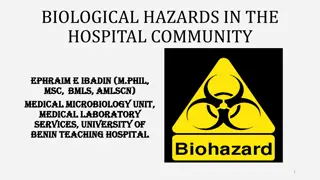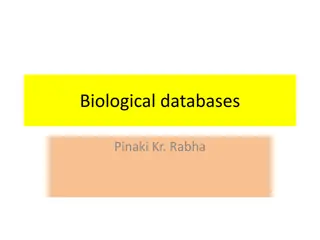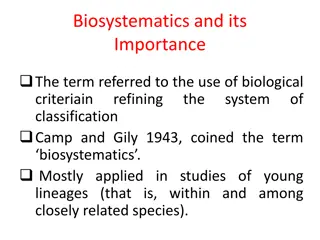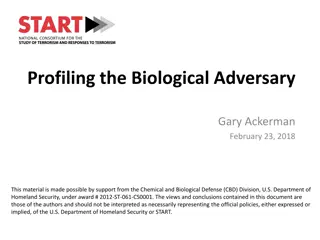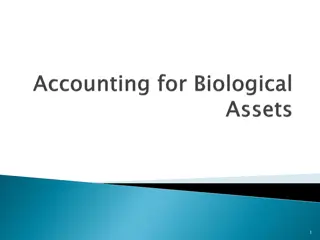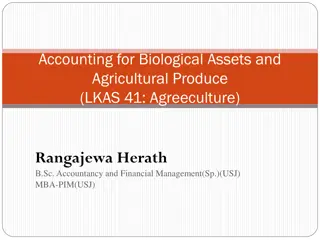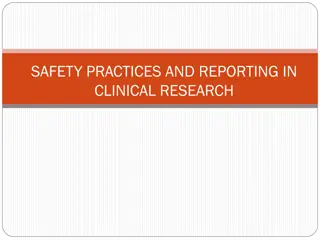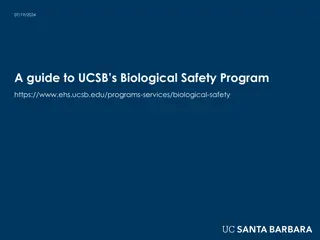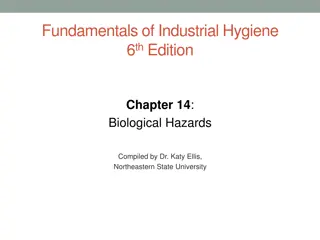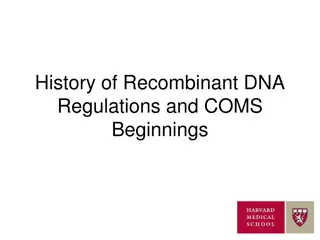FACILITY MANAGEMENT & SAFETY
Facility management and safety are interlinked disciplines crucial for optimizing workflow and ensuring a safe environment in various facilities. This includes managing space, infrastructure, resources, and staff effectively. Specific focus on laboratory facility management involves maintaining qual
3 views • 19 slides
Safety Health and Welfare.
The Campus Safety, Health, and Welfare (SHW) Committee at TU Dublin is vital for ensuring a safe and healthy environment for all members. Led by Edel Niland, the Senior Manager, the committee focuses on various aspects such as safety arrangements, committee structure, team organization, and safety t
3 views • 21 slides
Biological Registration Process and Administrative Controls for Safety Focus
Registering work involving biological materials, toxins, and recombinant DNA is essential for safety compliance. Principal Investigators must follow NIH guidelines and register with the Institutional Biosafety Committee. Contact NIH for additional instructions on working with toxins and Select Agent
4 views • 13 slides
Explore Agricultural and Biological Engineering (ABE) Programs at Purdue University
Discover the academic programs and valuable resources offered by the Agricultural and Biological Engineering (ABE) department at Purdue University. Meet the dedicated staff members, review degree options, and learn about upcoming events and registration processes. Explore opportunities in fields suc
2 views • 16 slides
Understanding Diverse Classes of Lipids in Biological Systems
Sphingolipids and waxes are important classes of lipids found in biological membranes, each with unique structures and functions. Sphingolipids, including sphingomyelins and glycosphingolipids, play crucial roles in nerve transmission, cell recognition, and tissue immunity. Waxes, on the other hand,
3 views • 4 slides
Biological Hazards in the Hospital Community
Healthcare workers face various occupational hazards, including biological risks, in hospital settings. This article by Ephraim E. Ibadin explores the definition, types, risk factors, sources, prevention, and control of biological hazards in hospitals, emphasizing the importance of protecting worker
0 views • 30 slides
Enhancing Safety: People Power SafetySTEP Refresher Training
Explore the comprehensive SafetySTEP Refresher Training program aimed at achieving safety through employee participation, engagement, and proactive safety measures. This training emphasizes creating a culture where safety is a core value, utilizing leading indicators to measure safety successes, and
0 views • 65 slides
Importance of Safety in Construction Business
Ensuring safety in construction projects is crucial for success. Safety measures should be integrated from the design phase to project completion. Key principles include having a dedicated safety department, considering safety records, allocating funds for safety management, providing safety educati
0 views • 64 slides
Comprehensive Building Safety and Emergency Preparedness Training
Enhance your safety preparedness with Building Safety Coordinator Training, Emergency Preparedness resources, Communication Resources, Fire Safety procedures, and Earthquake Safety measures. Learn about fire extinguisher use, fire response procedures, earthquake safety considerations, and the seven
1 views • 30 slides
Understanding Biological Datasets and Omics Approaches in Disease Research
Explore the world of biological datasets, lipidomics, genomics, epigenomics, proteomics, and the application of omics in studying biological mechanisms, predicting outcomes, and identifying important variables. Dive into DNA, gene expression, methylation, and genetic datasets to unravel the complexi
0 views • 34 slides
Overview of Lipids: Classification and Biological Importance
Lipids are organic substances that play a crucial role in biological systems. They include simple lipids, complex lipids like phospholipids and glycolipids, and derived lipids. Simple lipids are esters of fatty acids with various alcohols, while complex lipids are sub-classified based on the type of
2 views • 38 slides
National Mine Safety Week 2023 - Vehicle Safety Guidelines
Explore the comprehensive safety guidelines for vehicle operation during National Mine Safety Week 2023. Learn about maintaining safety equipment, cabin safety systems, visibility safety systems, operational safety systems, emergency safety systems, other safety systems, training responsibilities, a
1 views • 10 slides
An Overview of Biological Databases in Bioinformatics
Biological databases play a crucial role in bioinformatics, storing vast amounts of data related to nucleotide sequences, protein sequences, and more. These databases are publicly accessible and essential for research in biological fields. Primary databases, such as GenBank, EMBL, and DDBJ, contain
0 views • 13 slides
Understanding Biosafety and Biosecurity Principles
Biosafety and Biosecurity are essential concepts in safeguarding against biological hazards. This article explores the definitions of hazard, threat, and risk, emphasizing the importance of managing risks associated with biological materials through biosafety and biosecurity measures. Learn about th
0 views • 26 slides
Understanding Chemical Groups and Macromolecules in Biological Processes
In biological processes, certain chemical groups play crucial roles in molecular functions. These functional groups, including hydroxyl, carbonyl, carboxyl, amino, sulfhydryl, phosphate, and methyl, are essential for the structure and function of biological molecules. Additionally, macromolecules, s
0 views • 9 slides
Comparative Analysis of Aviation Safety Management Systems: MSG-3 vs. SMS
The aviation industry continuously strives to enhance safety, leading to the development of Safety Management Systems (SMS) by ICAO and the longstanding Maintenance Steering Group (MSG-3) program. These systems focus on improving safety through different approaches, with MSG-3 emphasizing engineerin
1 views • 25 slides
Trickling Filter: A Sustainable Wastewater Treatment Solution
The trickling filter is a biological treatment process utilizing a solid media where bacteria accumulate to maintain high populations. Bacteria growth occurs on the media surface with oxygen provided by air diffusion. As bacteria metabolize waste, they reproduce, creating a biological layer. Filter
5 views • 26 slides
Ensuring Contractor Safety in Higher Education: Key Practices and Guidelines
Highlighting the importance of contractor safety in higher education, this content emphasizes the need for effective safety planning, compliance with OSHA standards, and risk mitigation strategies. It discusses serious events in higher education related to contractor safety and provides insights on
0 views • 24 slides
Understanding Biosystematics and Its Significance in Biological Classification
Biosystematics plays a crucial role in refining biological classification by focusing on biological criteria to define relationships within closely related species. It helps delineate biotic communities, recognize different biosystematic categories, and understand evolutionary patterns. Through the
0 views • 15 slides
Proactive Safety Measures: PDO Safety Stand Down April 2024
A Safety Stand Down is a crucial activity to proactively discuss safety with employees, emphasizing risk awareness and injury prevention. The incident involving a fatal injury during Rig Move activities serves as a catalyst for reflection and improvement regarding safety procedures. This guide provi
1 views • 4 slides
Understanding Biological Adversaries: Education Levels and Demographics
Exploring the traits of biological adversaries, this study reveals that perpetrators with higher education levels are more likely to successfully use chemical and biological agents. Success tends to increase with age and years of activity. Most individual perpetrators originate from the MENA region,
0 views • 16 slides
Neutrino Platform Hall Access and Safety Guidelines
Guidelines for accessing and ensuring safety within the Neutrino Platform Hall at CERN, including registration, permissions, safety trainings, required equipment, online trainings, access points, and safety team responsibilities. Access is granted through registration at CERN, completion of safety t
1 views • 7 slides
Importance of Safety Education for Graduate and Undergraduate Students
Graduate and undergraduate students often lack safety knowledge and ethics, emphasizing the need for safety education over mere training. Safety education builds critical thinking, promotes safety ethics, and prepares individuals to handle future safety issues. Incorporating safety teachings through
3 views • 11 slides
Accounting for Biological Assets and Agricultural Produce
At the end of this lesson, you will be able to identify the principal issues in accounting for biological assets and agricultural produce at the time of harvest. Topics include the recognition, measurement, presentation, and disclosure of biological assets in financial statements. Questions regardin
0 views • 26 slides
Accounting for Biological Assets and Agricultural Produce (LKAS 41: Agriculture) by Rangajewa Herath
This content provides insights into the accounting standards for biological assets and agricultural produce under LKAS 41, discussing classification, presentation, measurement, gain or loss recognition, and disclosure requirements. It covers the unique nature of biological assets, the scope of LKAS
0 views • 20 slides
Understanding Workplace Safety Hazards: Physical, Chemical, and Biological Risks
Explore the three main types of workplace safety hazards - physical, chemical, and biological - with a focus on identifying potential risks and ensuring a safe work environment. Learn about common hazards such as repetitive motion, chemical exposure, and handling biological materials, essential for
0 views • 97 slides
Night Surface Operations Safety Guide - Ensuring Crew Members' Safety
This presentation highlights the importance of safety in night surface operations, emphasizing the primary mission goal of ensuring all crew members return home safely. It discusses the culture of safety, emphasizing that safety is not just a program but a state of mind, attitude, and commitment. Th
0 views • 34 slides
Reexamining the Biological Race Debate by Quayshawn Spencer
Quayshawn Spencer reexamines the biological race debate, discussing the onto-semantic strategy, its problems, and applications to public health genomics. The philosophical foundations of biological racial anti-realism are critiqued, exploring the concept of race through historical perspectives like
0 views • 37 slides
NUSSC 57th Meeting - End of Term Report & Safety Standards Update
The 57th Meeting of the Nuclear Safety Standards Committee (NUSSC) concluded its 9th term with significant achievements including the approval and publication of multiple safety standards. Key highlights include the development of new standards such as SSG-3, SSG-88, SSG-89, and SSG-90 focusing on v
0 views • 8 slides
Biology Integration Institutes (BII) - NSF Research Opportunity
Supporting collaborative teams of researchers exploring overarching biological themes, the Biology Integration Institutes (BII) provide a framework for integrated research in diverse biological disciplines. This initiative enables design and development activities, with potential for significant fun
0 views • 10 slides
Safety Practices and Reporting in Clinical Research
Safety practices and reporting in clinical research are crucial for ensuring the rights, safety, and well-being of trial subjects. This includes monitoring safety, reporting adverse events promptly, and following regulatory requirements. Investigators play a vital role in assuring subject safety and
0 views • 33 slides
Safety Clearance Procedure for NA62: Overview and Recommendations
The conventional safety clearance procedure for NA62 involves checks by DGS-SEE (HSE) and obtaining radiological safety clearance from the DGS/RP group. Various safety checks are outlined in memorandums by Mark Hatch and Jonathan Gulley. Safety files for NA62 are noted to be in poor states, lacking
0 views • 8 slides
Guide to UCSB Biological Safety Program
This guide provides an overview of UCSB's Biological Safety Program, covering important aspects such as lab safety fundamentals, biological use authorization, biosafety officer's role, and the Institutional Biosafety Committee. It outlines key steps like hazard assessment, training, waste management
0 views • 24 slides
Enzymes in Biological Reactions: Understanding Activation Energy
Enzymes, as biological catalysts, play a crucial role in regulating biological processes by lowering the activation energy required for chemical reactions in cells. The addition of enzymes changes the overall energy dynamics of reactions, impacting the rate at which products are formed. This interac
0 views • 7 slides
Analytical Toxicology: Techniques and Sample Analysis in Clinical Toxicology
Analytical toxicology involves the observation, identification, and measurement of foreign compounds in biological and other samples, such as urine, blood, stomach contents, nails, hair, and DNA. Various techniques are used to isolate and identify drugs and poisons present in these samples. This fie
0 views • 12 slides
Understanding Biological Factors and Crime: Genetics, Neurotransmitters, Neuro-biology
Biological factors such as genetics, neurotransmitters, and neuro-biology play significant roles in influencing criminal behavior. Genetics can predispose individuals to antisocial behavior, neurotransmitters like serotonin and norepinephrine impact social behavior, and neuro-biological damage can l
0 views • 13 slides
Understanding Biological Hazards in the Workplace: A Comprehensive Overview
This chapter delves into the realm of biological hazards in occupational settings, shedding light on the risks posed by microorganisms, arthropods, allergens, toxins, and more. It highlights the diverse range of biological agents that can lead to infections, allergies, toxic reactions, and even seri
0 views • 45 slides
Advancing Biological Data Standards for Marine Research
Discussion on biological data standards for marine research, challenges faced, existing standards, and the need for guidance and community building. Goals include maximizing data relevance for biodiversity studies. Ongoing work involves developing a primer for data managers unfamiliar with biologica
0 views • 7 slides
Understanding COMS and Recombinant DNA Regulations
The Committee on Microbiological Safety (COMS) was established in 1978 to address public concerns regarding safety, environment, and ethics of research involving hazardous biological agents. COMS oversees activities related to recombinant DNA and biological agents at Harvard, supporting all schools
0 views • 6 slides
Understanding Statistics for Biological Data in Courses
Dive into the world of statistics for biological data through a comprehensive course led by experienced instructors at the University of Sheffield. Explore the fundamentals of statistics, research questions, hypotheses, and hypothesis testing related to biological inquiries. Gain insights into organ
0 views • 14 slides





